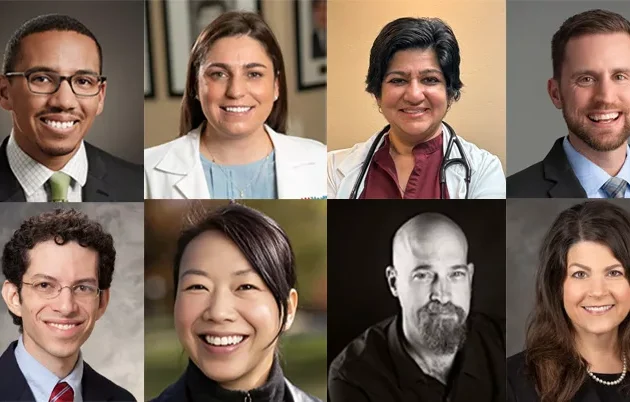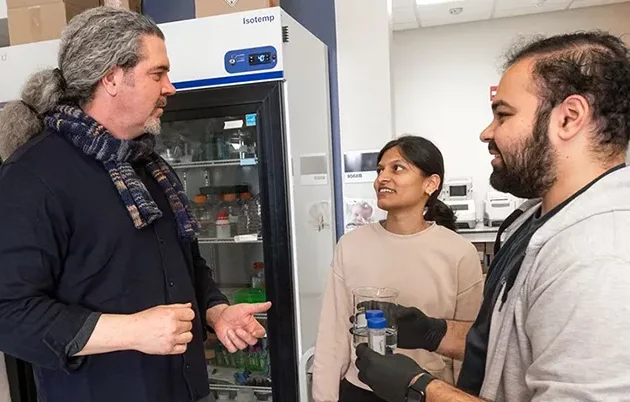In Memoriam: Hans W. Sollinger, Guillermo de Venecia, Merle A. Evenson
Hans W. Sollinger, MD, PHD, FACS
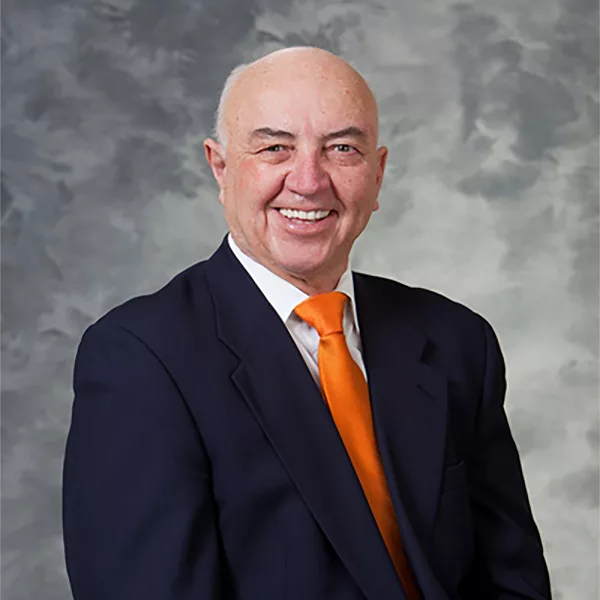
Professor Emeritus Hans Sollinger, MD, PhD, FACS, died on May 15, 2023, at age 76, in Madison, Wisconsin. A groundbreaking transplant surgeon, researcher, and educator, Sollinger earned his medical and doctoral degrees from the University of Munich in his home country of Germany. Following an immunobiology research fellowship at University of Wisconsin–Madison and a general surgery residency at UW Health, he was recruited to the UW School of Medicine and Public Health (SMPH) faculty in 1980 by Folkert Belzer, MD, then chair of the Department of Surgery. Sollinger’s transplant surgical service and faculty appointment, respectively, spanned 40 years. He was chair of the Department of Surgery’s Division of Transplantation from 1995 to 2009. Among Sollinger’s numerous contributions to transplantation, he pioneered the introduction of bladder drainage for pancreas transplantation, played a pivotal role in the development of mycophenolate mofetil aimed at decreasing rates of organ rejection, and was the first surgeon to use the UW Solution for pancreas preservation and the first to perform 1,000 combined kidney-pancreas transplants. He was devoted to giving his patients a better life through transplantation. He also was passionate about training future transplant surgeons. At the SMPH, he developed one of the premier transplant surgery fellowship programs in the nation. Over time, he trained 59 transplant surgical fellows, several of whom have become leaders in the field. Sollinger served as president of the American Society of Transplant Surgeons (ASTS) and the International Society for Organ Donation and Procurement. He was a member of the National Institutes of Health’s Surgery, Anesthesiology, and Trauma Study Section and of the Wisconsin Department of Health’s Advisory Committee on Organ Transplantation. He received the ASTS Francis Moore Excellence in Mentorship in Transplantation Surgery Award and Pioneer Award, and the Transplantation Society-Roche Award for Outstanding Achievement in Transplantation Science (Clinical), among others. He was the first honorary member of the German Society for Transplantation. Widely published throughout his career, Sollinger focused his research for the past 20 years on gene therapy for type 1 diabetes and the prevention of fibrosis after transplantation. “Dr. Sollinger was a true pioneer. His drive for innovation and his passion for excellence shaped the field of transplantation surgery at our school and across the world. His legacy will live on forever,” says SMPH Dean Robert N. Golden, MD.
Guillermo de Venecia, MD (PG ‘59)
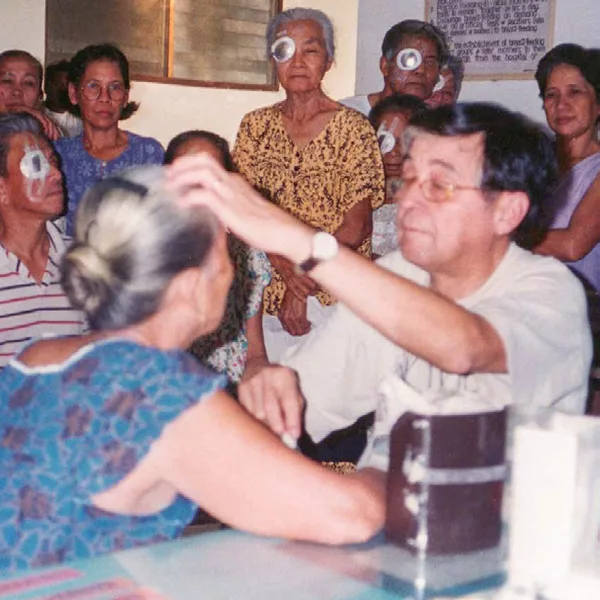
Guillermo de Venecia, MD (PG ’59), died May 11, 2023, at age 91, in Middleton, Wisconsin. His career with the University of Wisconsin School of Medicine and Public Health’s (SMPH) Department of Ophthalmology and Visual Sciences (DOVS) spanned more than four decades, and his influence is felt locally, nationally, and globally. Born in the Philippines, de Venecia immigrated to the United States in 1956 to begin an ophthalmology residency at the SMPH. He also completed a glaucoma fellowship at the Massachusetts Eye and Ear Infirmary, a neuro-ophthalmology fellowship at Bascom Palmer Eye Institute, and an ophthalmic pathology fellowship with the Armed Forces Institute of Pathology. This training gave him insights into disease physiology. Initially an instructor at the SMPH, de Venecia joined the faculty in 1962. He ran a retinal disease clinic and amassed an extensive list of accomplishments and publications. In DOVS, he served as the ophthalmic pathology director for 27 years. He retired as a professor in 1999. With partners, de Venecia helped establish the state’s first eye bank, the Eye Bank of Wisconsin, in 1969. Ten years later, he and his wife established the Free Rural Eye Clinic in the Philippines to provide eye surgery to cataract-blind individuals who could not afford care. That clinic has treated more than 250,000 patients. In 2014, the Free Rural Eye Clinic established the Guillermo and Marta de Venecia Educational Fund at DOVS; the money is used to provide free eye care and surgery to indigent patients of the Philippines and to train eye doctors and vision researchers. It also supports an annual lecture in de Venecia’s honor. DOVS Chair Terri Young, MD, MBA, says, “Dr. de Venecia was a pioneer and a generous, loving spirit. His legacy lives on in the many patients he had touched both in Madison and in the Philippines.”
Merle A. Evenson, PhD
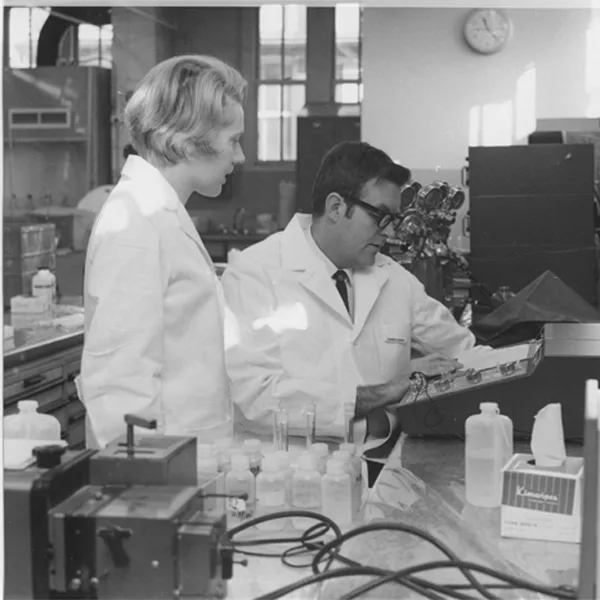
Renowned chemist Merle A. Evenson, PhD, passed away on April 19, 2023, at age 88, in Holmen, Wisconsin. For more than 35 years, he was an esteemed faculty member at the University of Wisconsin School of Medicine and Public Health (SMPH) and University Hospital (now part of UW Health). He earned a doctoral degree in chemistry from UW–Madison. In 1965, he became an instructor there and later created a master’s program in analytical clinical chemistry. He taught and mentored learners of all levels. Evenson also rose through the ranks in the Clinical Chemistry Laboratory at UW Health, eventually serving as director. He introduced numerous instruments and techniques — including gas chromatography/mass spectrometry. He was part of the team that installed the first digital computer in the Clinical Chemistry Laboratory, and he installed and connected more than 10 new channels of AutoAnalyzer instruments. Evenson left UW–Madison for one year to work at Harvard Medical School and Peter Bent Brigham Hospital in Boston. He returned to UW Health as the director of the Analytical Toxicology Laboratory, where he created laboratories for drug monitoring and trace metal analyses. He rose to professor with tenure in the SMPH Department of Pathology and Laboratory Medicine. During the 1980s, Evenson was the principal investigator on three simultaneous National Institutes of Health RO1 grants. “Dr. Evenson was of great help as an advisor in setting up research laboratory procedures—a first step in quality control and reproducibility — that were essential for bench research. He was generous with his time and advice,” says William W. Busse, MD ’66 (PG ’70), emeritus professor of medicine, SMPH. Evenson served on and chaired many committees, including the SMPH Admissions Committee. He also was an advisor to multiple national organizations, including the Oak Ridge National Laboratory, and served on editorial boards for peer-reviewed journals. He was board certified by the American Board of Clinical Chemists, in which he was a diplomat and served in several leadership roles. Dennis G. Maki, MD ’67, emeritus professor of medicine, SMPH, adds, “With Dr. Frank Larson, Dr. Evenson built a clinical chemistry lab at University Hospital that was as good as any in the country. Dr. Evenson was an international figure in his field. He also was a kind man who generously helped advance the careers of junior colleagues and numerous trainees.”
